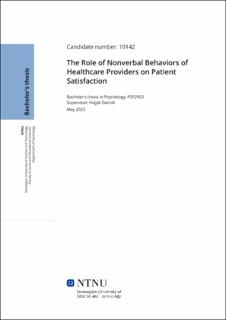The Role of Nonverbal Behaviors of Healthcare Providers on Patient Satisfaction
Bachelor thesis
Permanent lenke
https://hdl.handle.net/11250/3077755Utgivelsesdato
2023Metadata
Vis full innførselSamlinger
- Institutt for psykologi [3085]
Sammendrag
Pasienttilfredshet (“patient satisfaction”) utgjør en viktig del av helsevesenet og kan bli styrket eller svekket av den ikke-verbale atferden til helsepersonell (Mast et al., 2008b; Pawlikowska et al., 2012). Det er derimot lite vi vet om hvordan spesifikke ikke-verbale atferder påvirker pasienttilfredshet. Formålet med denne oppgaven var derfor å undersøke forholdet mellom pasienttilfredshet og den ikke-verbale atferden til helsepersonell. Det ble utviklet to faser for å undersøke dette forholdet. Den første fasen av studien testet validiteten og reliabiliteten til en rekke videoer av et helsepersonell som anbefalte en smertebehandling. En gruppe kodere (N = 7) vurderte flere psykososiale karakteristikker ved helsepersonellet på tvers av fem oppfatninger utledet fra ikke-verbal atferd (kompetanse, varme, inkompetanse, kaldhet og nøytral). Resultatene støttet validiteten og reliabiliteten til de tiltenkte ikke-verbale karakteristikkene og den ikke-verbale karakterskalaen. I den andre fasen gjennomførte deltakerne (N = 66) en digital spørreundersøkelse hvor de samme videoene ble vist til dem. Funnene indikerte at pasienttilfredshet var positivt relatert til kompetanse og varme, og negativt relatert til inkompetanse og kaldhet. Resultatene viste videre at deltakerne med kompetent helsepersonell var mer tilfredse enn deltakerne med inkompetent helsepersonell. Disse funnene kan brukes til praktiske formål i opplæring av kommunikative ferdigheter hos helsepersonell for å sikre pasienttilfredshet. Pasienttilfredshet kan videre bidra til andre positive utfall som at pasienten følger den foreslåtte behandlingen og oppnår vellykket behandling (Ware & Hays, 1988). Nøkkelord: ikke-verbal atferd, pasienttilfredshet, helsevesen, lege-pasient-forhold Patient satisfaction is an important part of healthcare settings and can be enhanced or attenuated by the nonverbal behavior of healthcare providers (Mast et al., 2008b; Pawlikowska et al., 2012). However, little is known about how specific nonverbal behaviors of healthcare providers influence patient satisfaction. The present thesis aimed to investigate the relationship between patient satisfaction and nonverbal behaviors of healthcare providers. To explore this relationship, two phases were developed. In the first phase of the study, a series of videos showing a healthcare provider recommending a treatment for pain with different nonverbal characteristics were tested for validity and reliability. Coders (N = 7) rated several psychosocial characteristics of the healthcare provider across five nonverbal conditions (competence, warmth, incompetence, coldness, and neutral). Results supported the validity and reliability of the intended nonverbal characteristics and the NB rating scale.In the second phase, participants (N = 66) partook in an online survey where the same videos of healthcare providers were displayed to them. The findings indicated that patient satisfaction was positively related to competence and warmth, and negatively related to incompetence and coldness. Results further indicated that participants of competent healthcare providers were more satisfied than participants of incompetent healthcare providers. These findings can be used for practical purposes in educating of communicative skills in healthcare providers to ensure patient satisfaction. Patient satisfaction can further lead to other positive outcomes such as compliance to and successful treatment (Ware & Hays, 1988). Keywords: nonverbal behavior, patient satisfaction, healthcare, patient-provider relationship
